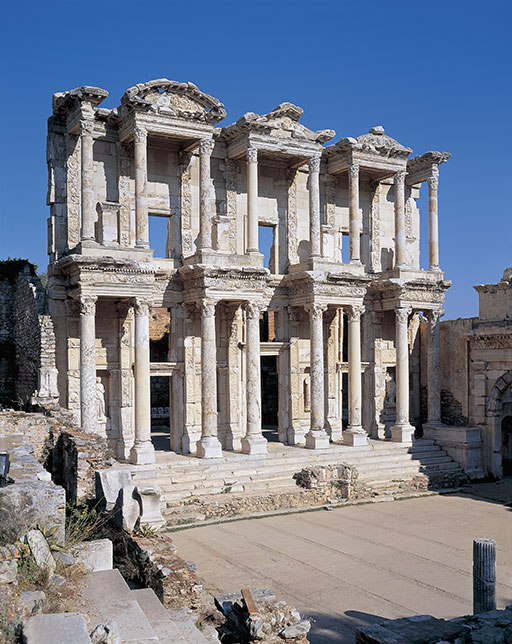1.7 The quantity of Greek and Latin
It seems odd to consider the quantity of writing rather than its quality. Nevertheless, the sheer volume of classical writing, especially in Greek, is remarkable and forms an important backdrop against which to consider any individual author or work of classical literature. Most of this writing has been lost but we catch occasional glimpses of how much must have once existed. The library of Alexandria, for instance, is said to have contained half a million rolls of papyrus; its nearest rival, the library at Pergamum near Troy contained some 200,000.

It is worth keeping this larger context in mind when researching a particular author. A useful question to begin with is what did he (or, rarely, she) write and how much has survived? The answer might be sobering. Try the following question.
Activity 2
a.
roughly 100
b.
roughly 200
c.
roughly 300
The correct answer is c.
Answer
Our best estimate is around 300. Although most of the plays do not survive, lists of titles are preserved from the Byzantine era.
Euripides seems more prolific than his rivals, but the figures are misleading. We possess more of his works thanks to the chance survival of a volume of plays beginning with Greek letters from epsilon (the fifth letter of the alphabet) to kappa (the tenth).
Similar misfortunes have befallen Latin authors. Of the 142 books of Livy’s history of Rome, only books 1−10 and 21−45 survive, with a few gaps. Likewise there are gaps in the works of the historian Tacitus, perhaps most frustratingly for historians his account in the Annals of the death of the emperor Tiberius, the reign of Gaius (Caligula) and the accession of Claudius.
Another important question is how much literary work was taking place outside the canon of well-known authors. Comedy provides an interesting comparison with tragedy here. The only complete comedies to survive from the fifth century BCE are those written by the comic playwright Aristophanes (eleven of whose plays survive in total, representing around 25 per cent of his total output). But as with tragedy, we know the names of many more comic playwrights whose works are either lost or survive only in fragmentary form.
Activity 3
How many comic poets do you think were writing in the fifth century BCE? What kind of scholarly tools might you use to help you arrive at an informed estimate?
Discussion
Although we cannot hope to answer this question precisely, there are various resources we can use to help us to arrive at an estimate. An obvious place to start might be a reference work like the Oxford Classical Dictionary whose entry on ‘comedy (Greek), Old’ provides some basic information on early comedy (‘Old Comedy’ is the name given to the kind of comedy being written in the fifth century BCE, which differs from later ‘Middle Comedy’ and ‘New Comedy’). This OCD entry contains the names of some of the better known fifth-century playwrights, and also points you towards further reading, such as modern collections of surviving fragments of comic writers.
Another approach is to use an online resource such as the Thesaurus Linguae Graecae [Tip: hold Ctrl and click a link to open it in a new tab. (Hide tip)] (‘Treasure Store of the Greek Language’, usually abbreviated to TLG), a database which contains a list of ancient authors tagged by genre (e.g. ‘comic.’, ‘epic.’, ‘hist.’, ‘trag.’). The basic TLG (which is free to use) is hugely useful for students and scholars alike, but since it contains only surviving, canonical works, it is hardly surprising that a search of this database reveals the name of just one fifth-century BCE comic writer: Aristophanes. But our search of the full database produced 49 results, giving a rough indication of the amount of non-Aristophanic comedy written in the fifth century BCE.
